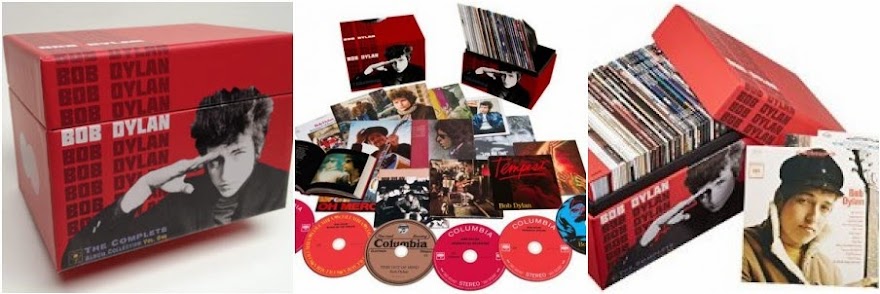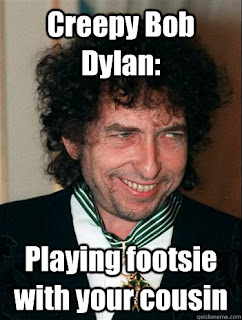Side Tracks does a similar job to The Beatles' Past Masters volumes, gathering together previously released material that doesn't appear on the studio albums. So here we get tracks that have appeared on compilations like Greatest Hits 1 and 2, Masterpieces and Biograph, including single releases. Unlike the very thorough Past Masters, it doesn't collect up every stray b-side, so although for a Dylan newbie like me it's absolutely great in rounding out the BobBox, it's probably not enough to satisfy the hardened Zim-head.
The material likely to generate most interest (certainly to me, anyway) are the album outtakes, which make up one-third of Side Tracks. The earliest is Baby I'm In The Mood For You from Freewheelin', a charming, carefree ditty first heard on 1985's colossal Biograph set. In fact 19 out of the 30 songs here are drawn from this game-changing 5LP compilation, including Blonde On Blonde outtakes I Wanna Be Your Lover and Jet Pilot (the latter merely a sub 1-minute sketch), and 'Times' outtake Percy's Song, which is heavily influenced by the folk song "The Dreadful Rain and Wind", and told from the point of view of a man whose friend has been sentenced to 99 years in prison. I'll Keep It With Mine is an especially great unused track from BIABH, with Bob alone on piano and vocal, bookended with harmonica. The original fuzzy demo recorded in '64 can be found on Bootleg Series Vol. 9, and a rough full-band rehearsal from the BOB sessions appears on BS Vols. 1-3.
A second outtake from 'Times', Lay Down Your Weary Tune, is particularly outstanding for lyrics like:
"I stood unwound beneath the skies
And clouds unbound by laws
The crying rain like a trumpet sang
And asked for no applause"
Wow.
Even better is Caribbean Wind, recorded during the Shot Of Love sessions, and a good example of Dylan's baffling decision-making when it comes to picking album tracks, dropped as it was in favour of stuff like Trouble and Lenny Bruce (I know, right?). But by far the best outtakes here are from the sessions for two of his very best albums: Blood On The Tracks and Desire. The second I heard Up To Me I could tell it immediately that it was from the BOTT era, since it sounds like a hybrid of You're Gonna Make Me Lonesome When You Go and Simple Twist Of Fate. It's as beautiful and consumed by loss as anything on BOTT, sharing the matter-of-fact narrative style and lack of self-pity that serves to magnify the heartbreak. I can't believe I've been missing out on it all this time, and frankly I'm cross with the readers of this blog for not pointing me in its direction. Desire cast-off Abandoned Love is simply superb, its dumping in favour of the turgid Joey surely a bigger crime than any of which Mr Gallo was accused. Written during the breakdown of Dylan's marriage to Sara, this song, along with Up To Me makes me yearn for a Bootleg Series volume concentrating on 1975-76. Surely this has to be next?
As well as previously unknown songs from album sessions, there are a couple of other outtakes; a demo of Forever Young, an alternate version of Quinn The Eskimo from the Basement Tapes, and the magnificent New York take of The Song That Can Do No Wrong: You're A Big Girl Now. It really is lovely, although it still doesn't beat the Hard Rain version, quite possibly my favourite Dylan recording ever.
Three other Basement Tapes songs make an appearance in re-recorded form: Down In The Flood, I Shall Be Released and You Ain't Goin' Nowhere. Bob had put forward the original versions for his Greatest Hits Vol. II in 1971, but they were deemed unsatisfactory by label boss Clive Davis. With the help of Happy Traum they were redone especially for the compilation (as well as a version of Only A Hobo, which wasn't selected, but can now be found on BS Vol. 10), and I must admit that I prefer these newer ones, mainly because The Band rather get on my tits, tbh.
Along with studio material, Side Tracks also includes half a dozen live cuts. I'd heard a demo of Tomorrow Is A Long Time on BS Vol. 9; the one here was recorded at a 1963 concert at New York Town Hall. As well as a rendition of I Don't Believe You in Belfast from 1966, a lovely solo acoustic Visions of Johanna from the (real) Royal Albert Hall the same year, and a much better Heart Of Mine than appeared on Shot Of Love, we get a fizzing Isis and a typically stop-start Romance In Durango from the Rolling Thunder tour. The latter performance, recorded at the Montreal Forum, was also filmed, and appeared in 1978's Renaldo & Clara.
This collection boasts eight non-album singles, from 1962's US-only Mixed-Up Confusion, sung in his young man's old man voice, through to late-period material such as Oh Mercy outtakes Series Of Dreams and Dignity. To those unfamiliar with the tribute to murdered Black Panther leader George Jackson, the rollicking Can You Please Crawl Out Your Window?, and the acerbic Positively 4th Street which sees Bob at his bitter best, Side Tracks becomes essential.
George Jackson was written during Dylan's relatively quiet stretch in the early '70s. This period also produced two more singles, both under the guiding hand of Leon Russell, and seem to reflect Bob's feelings during what many perceive to be a bout of writer's block (relatively speaking of course). When I Paint My Masterpiece has a sense of waiting for things to fall into place, with the lyric "Someday everything is gonna be smooth like a rhapsody", whereas on the blues-rock of Watching The River Flow (blues being something that Dylan would often fall back on in times of low creativity) the narrator complains "What's the matter with me, I don't have much to say...", while being content to wait, keeping an eye on the ever-changing waters.
The album wraps up with 2000's Things Have Changed, the Grammy and Oscar-winning single from the Wonder Boys OST and a fitting title to end this wide-ranging collection that spans almost four decades of Dylan's career.
Three other Basement Tapes songs make an appearance in re-recorded form: Down In The Flood, I Shall Be Released and You Ain't Goin' Nowhere. Bob had put forward the original versions for his Greatest Hits Vol. II in 1971, but they were deemed unsatisfactory by label boss Clive Davis. With the help of Happy Traum they were redone especially for the compilation (as well as a version of Only A Hobo, which wasn't selected, but can now be found on BS Vol. 10), and I must admit that I prefer these newer ones, mainly because The Band rather get on my tits, tbh.
Along with studio material, Side Tracks also includes half a dozen live cuts. I'd heard a demo of Tomorrow Is A Long Time on BS Vol. 9; the one here was recorded at a 1963 concert at New York Town Hall. As well as a rendition of I Don't Believe You in Belfast from 1966, a lovely solo acoustic Visions of Johanna from the (real) Royal Albert Hall the same year, and a much better Heart Of Mine than appeared on Shot Of Love, we get a fizzing Isis and a typically stop-start Romance In Durango from the Rolling Thunder tour. The latter performance, recorded at the Montreal Forum, was also filmed, and appeared in 1978's Renaldo & Clara.
This collection boasts eight non-album singles, from 1962's US-only Mixed-Up Confusion, sung in his young man's old man voice, through to late-period material such as Oh Mercy outtakes Series Of Dreams and Dignity. To those unfamiliar with the tribute to murdered Black Panther leader George Jackson, the rollicking Can You Please Crawl Out Your Window?, and the acerbic Positively 4th Street which sees Bob at his bitter best, Side Tracks becomes essential.
George Jackson was written during Dylan's relatively quiet stretch in the early '70s. This period also produced two more singles, both under the guiding hand of Leon Russell, and seem to reflect Bob's feelings during what many perceive to be a bout of writer's block (relatively speaking of course). When I Paint My Masterpiece has a sense of waiting for things to fall into place, with the lyric "Someday everything is gonna be smooth like a rhapsody", whereas on the blues-rock of Watching The River Flow (blues being something that Dylan would often fall back on in times of low creativity) the narrator complains "What's the matter with me, I don't have much to say...", while being content to wait, keeping an eye on the ever-changing waters.
The album wraps up with 2000's Things Have Changed, the Grammy and Oscar-winning single from the Wonder Boys OST and a fitting title to end this wide-ranging collection that spans almost four decades of Dylan's career.
(For some reason this video from Dylan's official
youtube channel cuts out the 8-second intro. It's also
a great example of Bob's idiosyncratic miming style.)
Side Tracks does a great job of filling in some gaps, and for those who've yet to investigate the vast Bootleg Series it serves to demonstrate how frequently first class songs were left off Dylan's studio albums, either to become standalone singles or just left in the vault. It's also enjoyable as an alternative whistle-stop tour of a lengthy recording career; sequenced in strict chronological order, it's possible to chart Bob's many styles and voices, from the husky folk troubadour, through the speed and electricity-fuelled rock star, country-loving family man and broken-hearted singer-songwriter, all the way up to the elder statesman at the turn of the century where the husk in his voice is real. It's a little light on the 80s and 90s, but I'm certainly not going to complain about that.
For those who already have most of the albums in the BobBox but not the compilations from which this collection is drawn, I'd definitely urge you to seek out Side Tracks. For those who have very little or nothing in the way of Dylan's work, and who have been reading this blog since it began on February the 5th last year - what are you waiting for?
*****BobBox price check*****
amazon.co.uk - £123.64 (free postage)
Discogs - from £115.80
Spin CDs - £99.99 (free postage)
Bob Dylan Official Store - £175.99
All prices correct on 9/02/2016
Right then, I'm off to listen to Shadows In The Night :)








